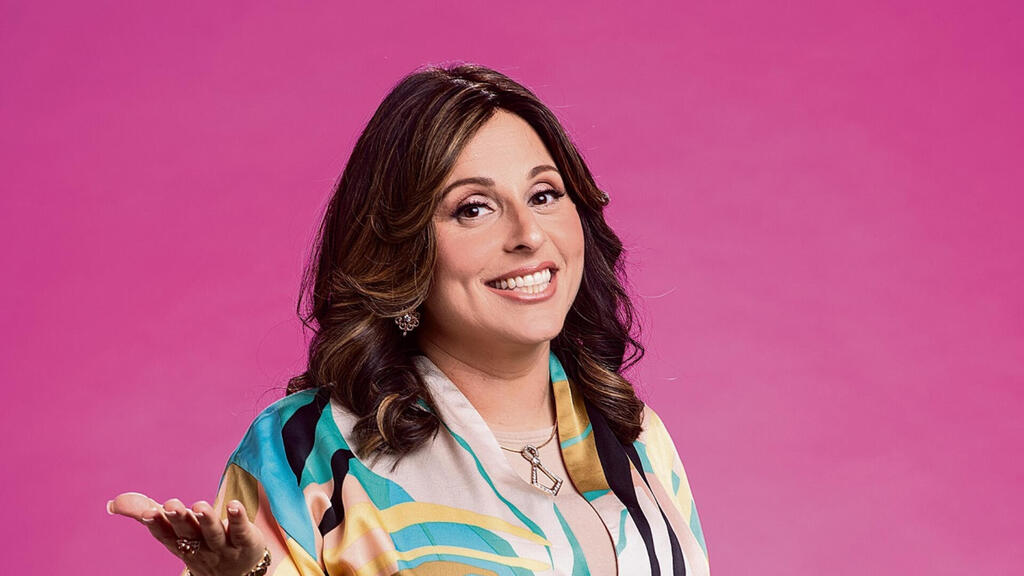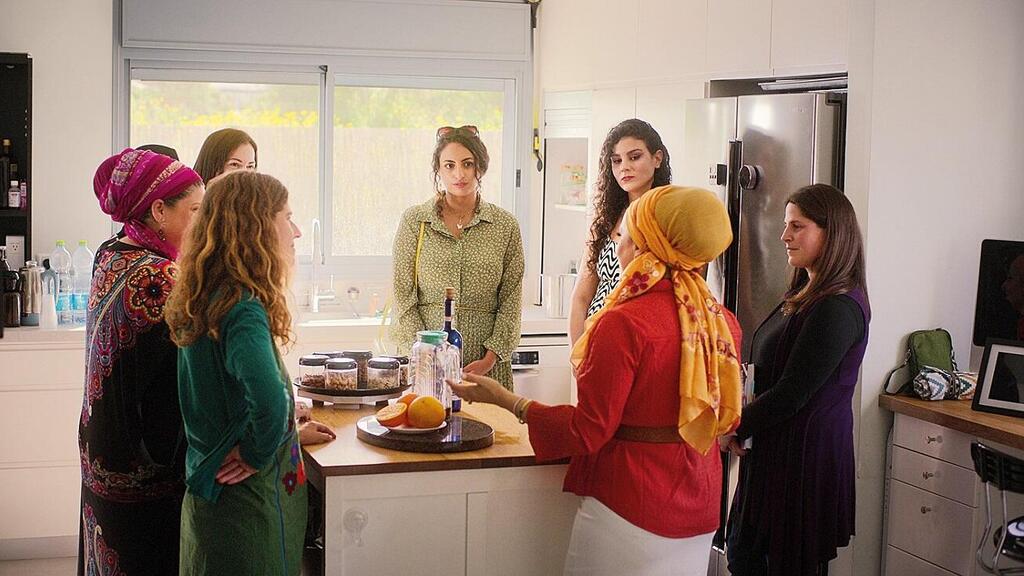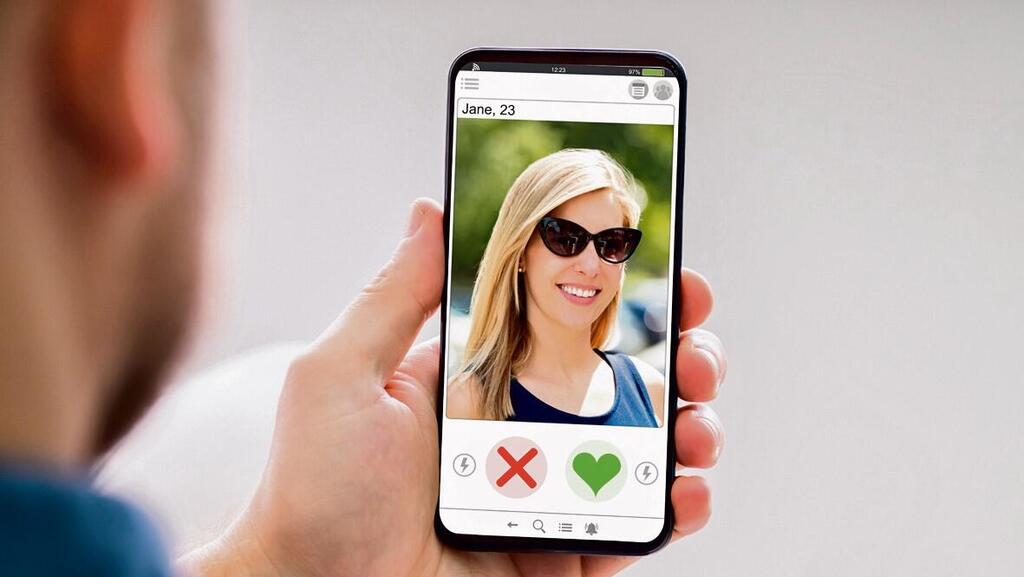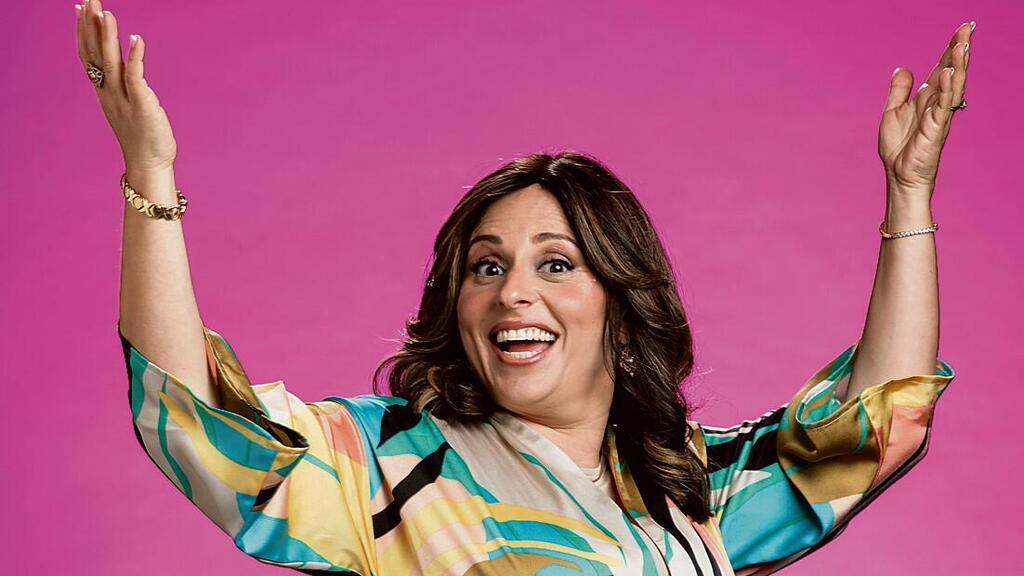On your screen, Aleeza Ben Shalom looks like the perfect match for Netflix's new and promising reality TV series, "Jewish Matchmaking". But the truth is, as Ben Shalom reveals to us now, with her huge smile that will soon become a trademark, she was not the casting recruiters' first choice at all.
Read More:
"Netflix first approached a matchmaker from Seattle, Laurie Young, who today works with me. She turned them down, but said, 'You should call Aleeza, you will love her, she's a pro in front of the camera'. They took her advice, called me up, and told me about the show's format. At that time, they were only at the stage of collecting the budget for the show, so in the meantime, I went on with my life."
Ben Shalom didn't just move on with her life, but took a sharp turn, left her native country, the United States, and immigrated to Israel with the prosperous matchmaking empire she built with her own two hands. "We made Aliyah, the entire family, specifically during the COVID period", she tells us in English sprinkled with some Hebrew. "And at that time, I really debated whether I should accept Netflix's offer, if I were to get accepted in the end."
And how did you decide?
"We were in quarantine at a hotel in Jerusalem until we found a permanent home, then we went to the Western Wall for the first time as Israeli citizens. At the Western Wall, I prayed to God to help me make the right decision. I told God that I wanted to do something big, that I wanted to change and enlighten the world with the values of Judaism.
I cried non-stop, I also thanked God for bringing me to Israel despite all the difficulties, and then, while I was thanking and debating - and of course crying nonstop - my phone rang. It was the producer of the series, who told me that they were sending me a contract and wanted to start filming. Wow, I needed proof that God agreed that I would do it - and that was my signal."
Usually, people would turn to Rabbis for advice
"Everyone asked me if I got a confirmation from this or that Rabbi. I talked to Rabbis, they all said they thought it would be fine, but I wanted God to send me a message, that I would be his emissary in this area, and that what I would do will be Kiddush Hashem. I wanted him to choose me as a representative of the Jewish nation for the entire world - and then this moment happened. I received a huge sign. Since then, everyone has been asking me if it's okay, what I'm doing on the show, and I answer that I have God's approval."
Don't stop searching
"Jewish Matchmaking", which aired last week and immediately made it to the top of the list of watched shows, can be defined as a hybrid between the flirtatious TV dating game "Too Hot to Handle" and the Israeli hit "Wedding at First Sight". It includes eight 29-minute episodes, in which eight single men and women from around the U.S. and Israel try to find true love, or at least win their 15 minutes of fame. All of this is overseen by Aleeza's optimistic presence, unapologetic directness, contagious smile, and a resumé that includes 200 couples already brought to Chuppah.
She had not met the contestants themselves up until the moment of the filming ("I only got a background on them and their profile"), but very quickly, thanks to her sharp senses, she realized that even if none of the couples would make it to the Chuppah, she might be able to help the singles who were watching the show, as well as the couples who need guidance and assistance but find it difficult to pay 400 NIS for a 45-minute session of couples therapy.
What can you tell about the participants?
"Everyone was interesting and funny. There were serious contestants, there were silly ones. The experience was good, but next season I will ask for participants with whom I have more ways to progress and can make it up until the Chuppah.
"For example Noah from Israel. At first, he seemed to me like a typical Tel Aviv 'flier', only 25 years old, someone who is not really interested in a long-term relationship. But I discovered someone amazing, serious, mature, sensitive, and fun. I realized that he was misrepresented and that he is someone I can work with. He was the one who surprised me the most. We had an excellent process, he dated three girls and with one of them, there was progress, which in the end did not work out because it was not the right time for him. I am sure that in the future he will find his match."
Share a behind-the-scenes secret with us.
"I have a special outfit for every place I go to in the show, an outfit inspired by the region, to give the person who meets me a comfortable feeling. To make him feel at home. The outfit I just wore for the shooting of this article, for example, is the outfit from Miami. In Israel, I wore a golden dress, because of the song 'Jerusalem of gold', or black denim of the hippies and the cool people. In the series, I wear a wig, but in Pardes Hanna, I always wear a headscarf, because it's more comfortable for me."
The creators of the series made also "Indian Matchmaking", a reality TV series that became a huge hit. Did you get to watch it?
"I watched all the episodes on a binge and I thought it was 'Wow'. When I realized that the format was almost the same, I said to myself, 'Aleeza, if they show the truth like this, along with all the hard and good things in India, you can also present the truth in this way.' I also saw how much the world loved it, so it made me more eager to do Jewish Matchmaking."
Your motto in the series is 'Date 'em til you hate 'em'. Please explain.
"I don't like the word hate, I built an entire business on love. So why do I use this particular phrase? First of all, it's easy to remember and catchy, every business needs a slogan like that. When you hear it, you will remember me. But it also means - give someone a real chance and give yourself a real chance too. You went on one date, didn't like it? Try again, if it's not a 'deal breaker,' if it's not terrible - try again. Even if there's one percent of success - it's worth the try.
"My most important tip for singles is never stop searching. Take breaks, take some time off, but never stop. Don't put work at the top of your priorities, nor friends. Put love on top. You're supposed to fail until you find the right one for you. The natural order is failure, failure, failure, and then you find the one. So don't give up."
Do you think today's singles are giving up too soon? Not giving a real chance?
"I think that if you don't turn to a matchmaker, you give up way too soon. With me, people make more effort, try harder, and they need much more patience. Today, for singles, the exterior look plays a very significant role. If someone likes the appearance of the person he's dating, he will give a lot more chances and he will extend the relationship for a longer time, even if he realizes that the girl is not the perfect match for him. If it is the other way around, and you don’t find the exterior look impressive, within one date it will be cut off, unfortunately."
What do you think about matchmaking apps?
"It's like asking me what I think about television. There is no answer to it being good or not good. It depends on what you watch. The apps can be an excellent way to get to know people, if you don't become obsessed and depressed by them. I know a lot of people who got acquainted that way. The apps opened the world and I think they have a place of honor in the world of love. I don't really have negative things to say about them. I do think that the habits that emerge from using this application should be moderated, because just swipe-swipe-swipe is not healthy."
What is your advantage over the apps?
"When you look at someone, can you tell anything apart from the initial appearance? No. So, if I just look at a picture - I can tell at least ten things about the person. Because I have the skills and the talent that most people don't. By the way, I also use these apps when people turn to me asking for help. I ask them to show me the 'matches' they had in the past so that I understand how the clients look at potential dates, their initial filter. Most people mainly show me their celebrity crush, but it's irrelevant," she laughs.
"As for your question, I don't think the apps steal the job of the matchmakers, but maybe they have turned the singles into matchmakers themselves. I actually like it. I even have a program where I teach the client to 'be your own matchmaker'. In my opinion, this is the hardest job on earth".
Shabbat is the answer
Ben Shalom was born in Philadelphia to a secular Jewish family. "We weren't even traditional. We would celebrate Rosh Hashanah, Yom Kippur, do Passover, and Hanukkah, and that was it. But one thing we did have, we were strong in our roots. We all love Israel very much. In fact, my biggest dream has always been to immigrate to Israel. The second dream was to be able to make a living from a job that makes me feel good." For the past two years, she has been living in Pardes Hanna, a mother of five children, and has been making a living from matchmaking for 15 years ("I got the talent for it as a gift from heaven").
She got married at the age of 25, to Gershon, who is ten years older than her. "After we got married, we stayed in Philadelphia near the family and started building a family of our own. Whenever I was asked what I wanted to be when I grew up, the quick answer was 'to be a mother and immigrate to Israel.'
At the age of 22, I joined a program for new Olim in Arad. I chose a program that had a good Ulpan so I could learn Hebrew on a daily basis. I had to be 'kicked in the butt' to make me study. After a year, when the program ended, I really wanted to stay in Israel, but I had no family here, no friends, no partner, and above all I had no courage. So, I returned home and was depressed.
I worked in an educational program with children with special needs, I was a school teacher alongside my mother, and I still wasn't happy. Then my brother got Crohn's disease and almost died, and I helped take care of him. And when he recuperated, I had to take a break, so I went on a retreat with a group of Jews under the guidance of a well-known rabbi in Orlando ".
This retreat changed her life. "I realized that God runs the world, and that Shabbat is the meaning of life. I realized it there, after we learned a lot and got to know more about the values of Judaism. When I returned, I went into my brothers' room and told them, 'Shabbat is the meaning of life, Shabbat is the answer to everything.' They thought I got crazy. But I told them to ask me any question and I would prove it to them with my answer.
Then my brother asked, 'How does five times five equal Shabbat?' I answered: 'Five times five is 25. Add five to two and you get seven. Seven is the days of the week, and Shabbat is the day of rest. So Shabbat is the answer.'
"Are you in shock? I was too. I left his room with chills, it was strange, but I was filled with inspiration. I said that I don't know all the rules, but 'All that the LORD hath said will we do, and be obedient.' I started observing Shabbat, kosher, I started praying and dressing modestly
My parents didn't accept it. I promised that I would make a Shabbat dinner if they went with me. They tried to go with it but they didn't connect, so I continued mostly in the Jewish community. In addition, I met my husband at the retreat, and four months later we got engaged. In five months, I turned from someone who wears short-sleeve shirts and flip flops into someone who is covered from head to toe".
And the dream of immigrating to Israel?
"The dream was always there. I made my husband swear that he would immigrate to Israel with me as soon as we could, and he agreed."
Soulmate Clarity
She came across matchmaking by chance, and due to a crisis: her husband's independent business collapsed and she - who until then had been raising the children - had to find a job.
"I started the matchmaking business as a hobby on a Jewish dating site when my two older children were just babies," she recalls, "it's a site where you don't have the option of choosing the match yourself, only the site's employees can match you using the information you upload there. In the past, the site was designated only for religious people and today it is open to everyone, from all countries, sectors, and ages.
There they gave me a matchmaking course, but in this profession, you either have the talent - or you don't. For me, the matches were not 'flat'. From the first day, I would ask the surfers in-depth questions, trying to get to know the person before I started looking for a match for him. I wouldn't do half the work, I would invest a lot in it. And of course, I did everything free of charge.
"The thing about this site is that you do get to choose the matchmaker for yourself, and gradually people really started searching for my name. When my husband's business closed, he said I had to find a job. I told him I had a job, that I was a matchmaker. He told me, 'No, you need to earn money.'
We had two small children at the time, and without income, we simply wouldn't make it through the month. My husband told me, 'work at what you want, as long as we manage to make a decent living.'
"I called a good friend of mine, I was heartbroken, I told her about the problems, about the charity in matchmaking, that I love doing it but I have to earn money. And she said to me simply, 'why don't you turn the charity into a living?'
I set out on the journey. I started developing a coaching workshop for couples or individuals who would come, talk to me, go through a process with me, and pay by the hour. Everything was done over the phone. And it worked really well. Then I started receiving inquiries from all over the world."
From a few phone calls here and there, Aleeza started receiving dozens of emails, and hundreds of requests for one-on-one live meetings. Very quickly she realized that she needed to transform herself from a "one-woman show" to a company.
"I started training employees," she recalls, "the first one who was accepted was my cousin. I explained to her that above all we need a lot of intuition. But how exactly do you teach intuition? That's a problem. She didn't really understand how I do things. So I started writing my Torah (theory) for matchmaking, just like a book. How to understand the personality of the person standing in front of you, his background, what he's looking for, and the fears he has. According to this theory, I trained my cousin.
"Over time, this Torah became the first book I published, a book that helps to find love and get you under the Chuppah. The book came out when I was seven months pregnant with my third child. Then I took a course in business management to understand how to run an entire business. It's been 15 years since it all started, and today I give lectures about business management at the place where I studied.
"I built my entire business from home. After teaching my cousin, I trained more coaches under my program while running the business. Today there are a hundred coaches from all over the world who have gone through my training. Some do it free of charge, some make it for money. In my business today there are ten coaches who work closely with me."
What is your matchmaking theory based on?
"A lot of people think it's just about finding a woman for a man - and that's it. But it's really not; there are three processes you have to go through when you come to me.
There's coordination: find a list of matches for the client, then, according to the data, choose the most suitable one. From there, I or my mentor help the client understand what he needs, why we chose who we chose, and finally, there is the closure phase that finalizes everything, after you have decided either to continue together all the way to Chuppah or to break up.
Each stage has a timeline. The shortest period of time in which we were able to bring a couple to the Chuppah is seven weeks. But the process can last as long as you want. There were couples who took them two years to get married."
In the show, you also work with single women and bachelors who are not religious at all.
"Also outside the show. Sometimes people come to me and say, 'I don't know if there is a God,' and I answer, 'It doesn't really matter to me.' There is a man, there is a woman, and there is something that works between them. That's all."
So the criterion is that they are Jewish?
"No," she said, "I don't only help Jews, anyone who wants me to coach him is welcome, from the age of 18 to the age of 90, and I even made a match at that age. Of course, my biggest networking is in the ultra-Orthodox world, but if I don't find a match for you, I'll send you to a matchmaker who can help you find love. I can also advise the LGBT community. I will never forgo someone without help."
By the way, do you see any differences between Israeli and American bachelors?
"It's funny that everyone asks me that. Everyone is obsessed with knowing about the differences between countries. But I'm sorry to disappoint you, there are none. Singles are singles everywhere in the world. Everyone wants to find love, and it's hard. Tel Aviv is like New York - there's always something to do, everyone is busy, and there are different priorities.
But there is a difference between singles in the city and singles in quieter places, but not between countries. It was no more difficult for me to match in Israel than in America; it was difficult to match singles in such a busy city."
Although she is a big believer in talent, God's gift, and intuition, Ben Shalom is also a big believer in an orderly, computerized method, with percentages, charts, and tables. "My best method is called 'Soulmate Clarity'."
Aleeza shows me on her mobile a chart that is divided into colors - green, yellow, orange, and red. Green represents "excellent", yellow - "accepted", orange - "not accepted" and red - "deal breaker".
"This is a chart that represents indicators of compatibility between two people for whom we have made a match. I measure values, qualities, and fears in this table. A good chart has 70 percent green. This is the way to the Chuppah according to Aleeza's method. This table is updated, and if there is still an orange left before the Chuppah - a parameter that is not fully accepted on one side, then there is no marriage. Either you fix it, or you don't get married."
Give an example of an orange characteristic.
"For example, a different background. When someone says 'I don't like the way she talks to me.' Or if there are physical issues, like someone who doesn't like the nose shape of her date. Sometimes it can't be fixed, so you have to choose whether you accept the orange wholeheartedly. This is the package; it won't change, and I accept it. Even if it gets worse - I still accept it. We don't sell dreams.
"People ask what my degree is in, how I qualified to be a matchmaker, but there are no degree studies, these are the skills I was born with. A gift from God. A gift. Like being an artist who is good with his hands. And you must share this gift because it is from God. I hardly sleep, I work hard, and at the same time I manage a family with five children, but I enjoy every minute of it."






